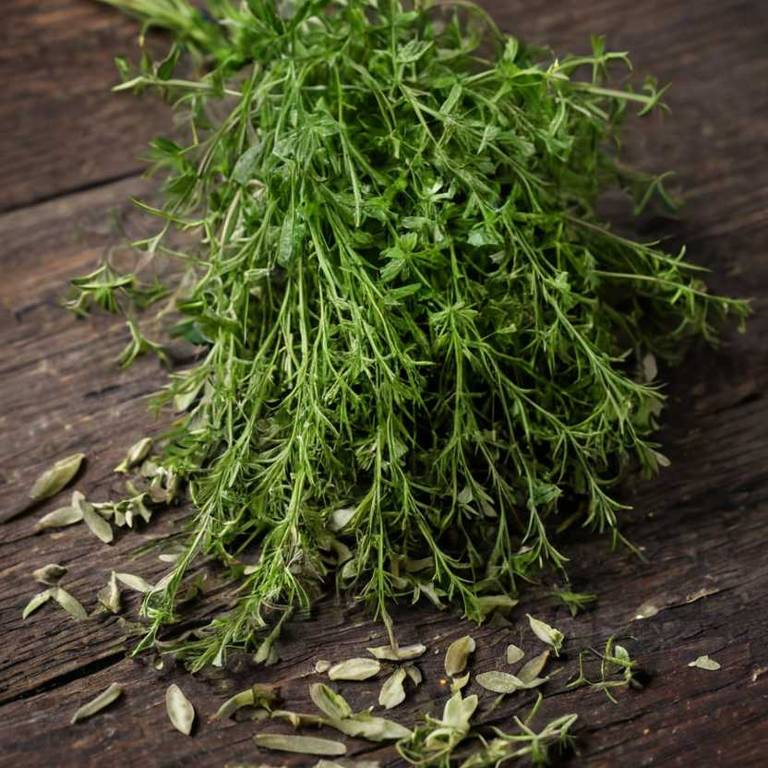By Leen Randell
Updated: Jul 07, 2024
10 Health Benefits Of Corchorus Olitorius (Jute)

Corchorus olitorius, also known as jute, has health benefits such as reducing inflammation, improving digestion, and acting as an antioxidant.
Its medicinal properties include mucilages, saponins, and phenolic compounds, which contribute to its anti-inflammatory and antimicrobial effects.
Regular consumption of jute leaves can alleviate symptoms of irritable bowel syndrome, improve nutritional deficiencies, and support overall well-being, particularly in populations with limited access to medical resources or balanced diets.
This article explains in details the 10 best health benefits of Corchorus olitorius.
1. Reduces inflammation
Corchorus olitorius reduces inflammation because it is rich in bioactive compounds such as flavonoids and phenolic acids.
These polyphenols have been shown to inhibit the production of pro-inflammatory enzymes and cytokines, thereby reducing inflammation and oxidative stress.
Additionally, the plant's fiber and saponins may help to soothe and protect the digestive tract, further contributing to its anti-inflammatory effects.
2. Improves digestion
Corchorus olitorius improves digestion because of its unique blend of nutrients and fiber content.
The mucilages present in jute help to soothe the digestive tract, reducing inflammation and irritation. Additionally, its high levels of antioxidants and anti-inflammatory compounds aid in breaking down food efficiently, promoting a healthy gut microbiome.
As a result, regular consumption of jute can alleviate symptoms such as bloating, constipation, and diarrhea, leading to improved overall digestive health.
3. Boosts immune system
Corchorus olitorius boosts immune system because of its rich antioxidant and polyphenol content.
The plant's leaves, in particular, have been shown to possess immunomodulatory properties, which help stimulate the body's natural defenses against infections and diseases.
Additionally, jute has anti-inflammatory effects that can reduce oxidative stress and alleviate symptoms associated with compromised immunity, making it a valuable addition to a healthy diet for overall well-being.
4. Reduces risk of chronic diseases
Corchorus olitorius reduces risk of chronic diseases because it is rich in antioxidants, flavonoids, and phenolic acids.
These bioactive compounds have been shown to possess anti-inflammatory and antioxidant properties, which can help protect against oxidative stress, inflammation, and cellular damage.
By consuming Corchorus olitorius regularly, individuals may be able to reduce their risk of chronic diseases such as heart disease, cancer, and diabetes, thereby promoting overall health and well-being.
5. Promotes healthy skin
Corchorus olitorius promotes healthy skin because of its rich antioxidant and anti-inflammatory properties.
The plant's leaves and stems contain high amounts of beta-carotene, flavonoids, and phenolic acids that help to combat oxidative stress and reduce inflammation in the skin.
This can lead to a reduction in signs of aging such as wrinkles and fine lines, as well as improvement in conditions like acne, psoriasis, and rosacea.
6. Improves vision
Corchorus olitorius improves vision because it is rich in antioxidants and flavonoids that protect the eyes from damage caused by free radicals.
The plant's high levels of beta-carotene convert to vitamin A in the body, which plays a crucial role in maintaining healthy vision by preventing age-related macular degeneration and promoting the health of the cornea.
Additionally, jute has anti-inflammatory properties that help reduce oxidative stress and inflammation in the eyes, further enhancing its benefits for ocular health.
7. Regulates blood sugar levels
Corchorus olitorius regulates blood sugar levels because of its unique bioactive compounds and phytochemicals.
The plant's extract has been found to inhibit the activity of enzymes involved in glucose production, thereby reducing blood sugar levels.
Additionally, Corchorus olitorius has been shown to have antioxidant and anti-inflammatory properties, which may help protect against insulin resistance and improve glucose metabolism, ultimately regulating blood sugar levels.
8. Reduces bad cholesterol
Corchorus olitorius reduces bad cholesterol because of its unique composition.
Jute is rich in soluble fiber, which binds to bile acids and prevents their absorption in the gut, leading to a decrease in low-density lipoprotein (LDL) or "bad" cholesterol levels. Additionally, jute contains flavonoids, which have been shown to improve blood lipid profiles by enhancing liver function and reducing inflammation.
Regular consumption of jute may thus help maintain healthy cholesterol levels, contributing to overall cardiovascular well-being.
9. Prevents anemia
Corchorus olitorius prevents anemia because of its rich content of essential nutrients such as iron, calcium, and vitamin K. The leaves of the plant are particularly high in iron, which plays a crucial role in transporting oxygen throughout the body and preventing fatigue and weakness associated with anemia.
Additionally, jute's antioxidant properties help to reduce oxidative stress and inflammation that can contribute to anemia.
Consuming jute as part of a balanced diet can help to support healthy red blood cell production and prevent anemia.
10. Promotes healthy pregnancy
Corchorus olitorius promotes healthy pregnancy because it is rich in antioxidants, vitamins, and minerals that support fetal development.
The leaves and seeds of the plant have been traditionally used in Ayurvedic medicine to treat various maternal health issues, including miscarriage, preterm labor, and preeclampsia.
Jute consumption has also been linked to improved placental function, reduced risk of birth defects, and enhanced immune system function during pregnancy.